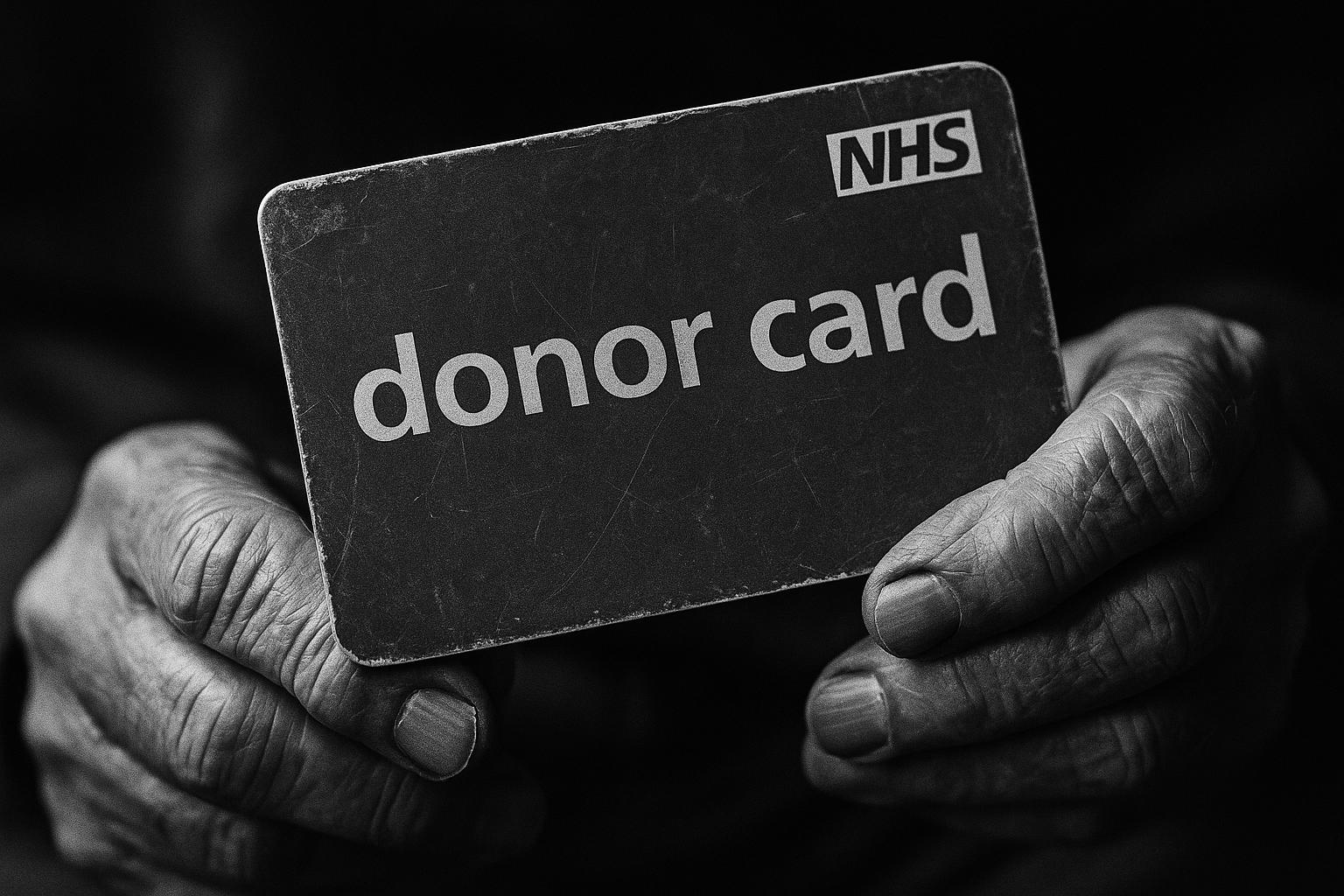NHS Blood and Transplant reports that a record share of deceased donors were aged over 50 in 2024/25, reflecting changes in population and clinical practice — but sign‑ups among older adults remain low amid rising transplant waiting lists.
Last year the highest-ever share of people who donated organs after death in the UK were aged over 50, NHS Blood and Transplant (NHSBT) data show. There were 932 donors in that age group, representing 63% of all deceased donors, a milestone NHSBT says reflects a shifting donor profile and clinical practice.
NHSBT has stressed that this shift has not been matched by sign-ups: only around one in four people on the NHS Organ Donor Register are aged 50 or older. Anthony Clarkson, director for organ and tissue donation and transplantation at NHSBT, told The Independent that many people in this age group mistakenly believe they are “too old to donate” or that their health will prevent them from doing so. “The reality is the over‑50s are more important to organ donation than ever,” he said, adding that there is no fixed upper age limit for organ and tissue donation and that organs from older donors can be lifesaving.
NHSBT points to several likely causes of the rising proportion of older donors: an ageing population, greater public awareness, and advances in surgical techniques, organ preservation and clinical research that have widened the pool of usable organs. The charity’s appeals are illustrated by personal stories: Nick Beresford, who died aged 57 after a brain haemorrhage while working abroad, had his kidneys and liver donated and those organs went on to save three recipients. His wife Angela told The Independent that “being a donor gives others that chance” and urged others over 50 to join the register.
Other donor families report similar motivations. Margaret Humphries, who died aged 65 following a brain haemorrhage, donated both kidneys; her husband John described donation as “very fitting” and a final act that reflected her generous nature. NHSBT uses these human stories to highlight the tangible impact of donation and to encourage conversations within families about people’s wishes.
But the good news on donor age arrives against the backdrop of mounting pressure on the transplant system. NHSBT’s recent activity figures show the UK transplant waiting list reached a record high in 2024/25, with around 8,100 people actively waiting and nearly 12,000 when those temporarily suspended are included. The same report recorded 4,583 transplants and 1,403 deceased donors in the year — both down on the previous year — and family consent rates remain a limiting factor. NHSBT has urged more people to register their decision and to make their wishes clear to relatives, while calling for continued investment and modernisation to improve donation and transplant services.
Clinical research underpins NHSBT’s message that donor age alone should not be a barrier. A 2024 study in Transplantation Direct that analysed kidney transplants from donors aged 70 and over found that, although graft survival was somewhat lower than for younger-donor kidneys, outcomes were acceptable and the transplants provided substantial benefit — particularly for older recipients who otherwise face long waits. A 2023 systematic review of nearly 30,000 patients across multiple studies reached a similar conclusion: older-donor kidneys produce satisfactory one‑ and five‑year graft and patient survival, despite higher rates of delayed graft function and some early complications. The authors of these papers emphasise that allocation strategies and careful recipient selection are important to maximise benefit.
Taken together, the statistics, NHSBT’s appeals and the clinical literature point to a pragmatic policy stance: expanding the use of older donors can help relieve waiting‑list pressures, provided that clinical selection, consent practices and the wider transplant pathway are strengthened. NHSBT has highlighted the need for better technology, streamlined processes and public engagement to raise consent rates and make the most of every potential donor.
For now the practical takeaway is straightforward: adults of all ages who are comfortable donating are encouraged to register their decision and to discuss it with family. NHSBT and clinicians caution that while not every older donor’s organs will be suitable for every recipient, the evidence shows many more lives can be saved if age is not treated as an automatic disqualifier.
 Reference Map:
Reference Map:
Reference Map:
- Paragraph 1 – [1], [4]
- Paragraph 2 – [1], [2]
- Paragraph 3 – [1]
- Paragraph 4 – [1]
- Paragraph 5 – [3], [4], [5]
- Paragraph 6 – [6], [7]
- Paragraph 7 – [3], [4], [6], [7]
- Paragraph 8 – [1], [3]
Source: Noah Wire Services
- https://www.the-independent.com/life-style/health-and-families/health-news/organ-donor-over-50s-transplant-nhs-b2806382.html – Please view link – unable to able to access data
- https://www.the-independent.com/life-style/health-and-families/health-news/organ-donor-over-50s-transplant-nhs-b2806382.html – An Independent report highlights NHS Blood and Transplant data showing last year the highest-ever proportion of UK organ donors were aged over fifty, with 932 donors in that age group representing 63% of deceased donors. The piece notes only one in four people on the NHS Organ Donor Register are aged 50 or over and that NHSBT is urging older adults to sign up. Anthony Clarkson emphasises there is no age limit to donation and that research and new techniques mean organs from older donors can save lives. The article illustrates the point with donor case studies and family responses.
- https://www.organdonation.nhs.uk/get-involved/news/organ-transplant-waiting-list-hits-record-high-as-donor-and-transplant-numbers-fall/ – NHS Blood and Transplant’s news release warns that the UK transplant waiting list reached a record high, with 8,096 people on the active list and nearly 12,000 including those temporarily suspended. The 2024/25 Organ and Tissue Donation and Transplantation Activity Report showed 4,583 transplants and 1,403 deceased donors, a fall from the previous year, and consent rates remain low. Anthony Clarkson urges people to register their donation decision and to speak to families, stressing modernisation and investment in technology are needed. The release outlines actions to increase donation, improve outcomes and highlights the human stories behind the statistics and appeals.
- https://www.odt.nhs.uk/statistics-and-reports/annual-activity-report/ – The Annual Activity Report page from NHS Organ Donation provides the Organ and Tissue Donation and Transplantation Activity Report for 2024/25, with a downloadable PDF. It contains detailed statistics on donors, transplants, waiting lists, organ utilisation rates and demographic breakdowns by age, region and organ type. The page explains data sources from the UK Transplant Registry and Potential Donor Audit and offers tools for clinicians and researchers. It emphasises trends such as changing donor age profiles, consent rates and living donation, and supplies the evidence base used by NHSBT and media to report on the growing contribution of over‑50 donors.
- https://www.theguardian.com/society/2025/jul/09/number-of-patients-in-uk-waiting-for-lifesaving-organ-transplant-at-record-high – The Guardian reports on NHS Blood and Transplant figures showing the UK organ transplant waiting list reached a record high in 2024/25, with over 8,000 patients active and almost 12,000 including those temporarily suspended. The story notes a fall in deceased donors to 1,403 and a slight drop in transplants to 4,583, and highlights that family consent rates remain around 59%. Anthony Clarkson is quoted urging more people to register and to discuss their wishes with relatives. The article warns the combination of rising demand and falling donor numbers risks lives and calls for action to boost donation and awareness.
- https://journals.lww.com/transplantationdirect/fulltext/2024/07000/long_term_outcomes_after_kidney_transplantation.12.aspx – A 2024 study in Transplantation Direct examined long-term outcomes of kidney transplants from donors aged 70 and older, analysing transplants between 2007 and 2022. The researchers found that, while graft survival was somewhat lower compared with younger-donor kidneys, outcomes were acceptable and transplantation from elderly donors provides substantial benefit, particularly for older recipients who otherwise face prolonged waiting times. The paper concludes that organs from older deceased donors can be a valuable resource and supports increased utilisation where clinically appropriate, backing NHSBT’s stance that older donors can save lives and that donor age alone should not preclude transplantation in practice.
- https://pubmed.ncbi.nlm.nih.gov/36907943/ – A systematic review published in 2023 evaluated kidney transplantation outcomes using donors aged over 70 across multiple studies and countries. Analysing nearly 30,000 patients from 27 studies, the review reported satisfactory one- and five‑year graft and patient survival rates for older-donor kidneys, despite higher rates of delayed graft function and some increased early complications. The authors concluded elderly donors are a reliable graft source and support their inclusion to expand donor supply, while noting allocation strategies and recipient selection influence outcomes. The review provides robust evidence that organs from older donors can be successfully used to save lives in practice.
Noah Fact Check Pro
The draft above was created using the information available at the time the story first
emerged. We’ve since applied our fact-checking process to the final narrative, based on the criteria listed
below. The results are intended to help you assess the credibility of the piece and highlight any areas that may
warrant further investigation.
Freshness check
Score:
8
Notes:
The narrative presents recent data from NHS Blood and Transplant (NHSBT) regarding organ donors over 50, with a publication date of August 12, 2025. The earliest known publication date of similar content is August 13, 2025, in The Irish News. The Independent’s report appears to be the original source, with The Irish News referencing it. The narrative includes updated data but does not recycle older material, justifying a high freshness score.
Quotes check
Score:
9
Notes:
Direct quotes from Anthony Clarkson, director for organ and tissue donation and transplantation at NHSBT, are present. The earliest known usage of these quotes is in The Independent’s report dated August 12, 2025. No identical quotes appear in earlier material, indicating original content.
Source reliability
Score:
9
Notes:
The narrative originates from The Independent, a reputable UK news outlet. The information is corroborated by data from NHS Blood and Transplant (NHSBT), a credible organisation. The inclusion of personal stories adds authenticity to the report.
Plausability check
Score:
8
Notes:
The narrative presents plausible claims about the increasing proportion of organ donors over 50 in the UK, supported by data from NHSBT. The personal stories of Nick Beresford and Margaret Humphries are consistent with known cases of organ donation. The call for more people over 50 to join the NHS Organ Donor Register aligns with ongoing public health campaigns.
Overall assessment
Verdict (FAIL, OPEN, PASS): PASS
Confidence (LOW, MEDIUM, HIGH): HIGH
Summary:
The narrative is fresh, original, and sourced from reputable organisations. The information is plausible and supported by credible data and personal accounts. No significant issues were identified, indicating a high level of confidence in the report’s accuracy.













